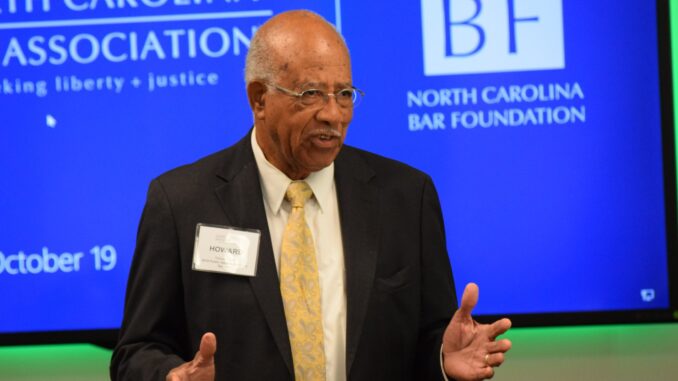
We need more Howard Lees in public office.
I got to know Howard through my brother, Dan. They are close friends because of their twin mutual interests in helping young minority male students get a great education and in the 1,175-mile Mountains-to-Sea Trail across North Carolina which Mr. Lee first introduced in 1977 when he was Secretary of the Department of Environment and Natural Resources under Gov. Jim Hunt.
Not only does Howard Lee make long treks on the trail across the state, he regularly plays 18 holes of golf while carrying his own bag. He is 88 years young. That is impressive no matter who it is.
I might have heard about a “Mayor Lee” as a youth growing up in Durham but I was more interested in making the football and basketball teams in the newly-integrated Githens Junior High School six miles down the road from Chapel Hill. He was the first elected African-American mayor of any municipality in the south since Reconstruction in 1969 which I am sure caused quite a stir in the state, but again, as a 13-year old, the significance of such an accomplishment was lost on me at the time.
Dan suggested I invite Mayor Lee to speak about his experiences to the Institute for the Public Trust classes I run which he has done dozens of times. His is a story which should challenge and inspire all of us regardless of race or political affiliation. His story trivializes any excuse anyone has today about not running for public office for any reason.
Howard moved to North Carolina in 1964 from Georgia after his military service in Korea to get a master’s degree in social work from the University of North Carolina at Chapel Hill. Afterwards, he was hired to direct a research program at Duke University so he is a proud product of both great institutions, contrary to those who think such things are not possible.
Howard and his wife had trouble finding a realtor who would help them buy a home even in liberal-minded Chapel Hill but they eventually found one in the Colony Park neighborhood and moved in to start raising their family.
Times were way different back then, even in a liberal town such as Chapel Hill. The Lees awoke to see a cross burning in their front yard one day. Most people would have just left town right then and there.
Howard decided to enter local politics. I guess he was just made that way. Or maybe his parents instilled in him a high standard of justice backed up by a whole lot of courage.
He didn’t set his sights just on the Town Council. Howard got permission from Duke University to keep his job while he ran for Mayor of Chapel Hill on his first foray into politics. They, along with most political observers, probably did not think he had much of a chance as a newcomer to politics to run and win so they let him do it.
Even Howard himself was surprised when he defeated former newspaper editor Roland Giduz by 400 votes. During his campaign, he had promised to get bus service extended to the black communities in Chapel Hill. Like many candidates, he didn’t have a plan as to how to actually get it done ― but once elected, unlike many other politicians, he found a way to extend the bus service.
After several terms as mayor of Chapel Hill, Howard ran for Lt. Governor in North Carolina in 1976 but was defeated in a primary runoff by House Speaker Jimmy Green. He served as Secretary of DENR before being elected to serve five terms in the NC Senate from Orange County between 1990 and 2002.
Howard is a Democrat. I am not. He was brought up as a Republican in his formative years in a time when close to 50% of all African-Americans in the South were Republicans before 1964 which always leads to more questions about how Republicans can do things differently today.
We don’t agree on every issue we talk about ― but we do talk about them. Howard has always taken the long view of where he thought America should go ― and reached out to people on the other side to try to pull them to his vision and approach. We both agree that our democratic republican form of government is at risk ― it is at risk because the people who should run for office are not doing so in droves and those who do run do not talk civilly with people on the other side of the political spectrum.
He is a living, breathing, walking and still talking American political hero. We would all do well to follow his example starting this Martin Luther King memorial weekend.

